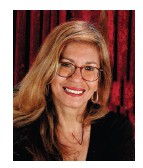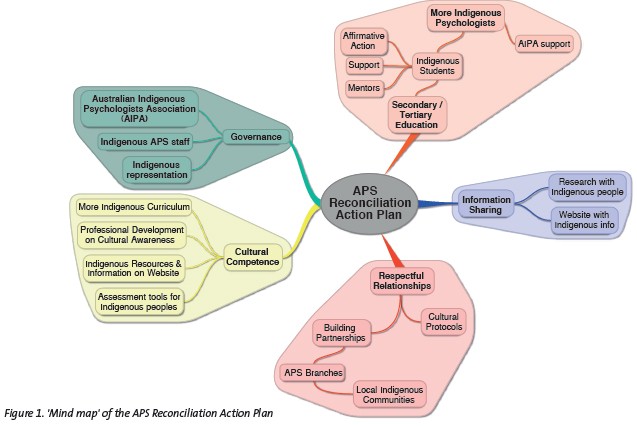 Professor Pat Dudgeon FAPS has been a tireless advocate for the mental health and wellbeing of Aboriginal and Torres Strait Islander people. Currently a Research Fellow at the School of Indigenous Studies, University of Western Australia, Pat has been a member of the APS for over 30 years and was the first Indigenous person to be elected to APS Fellowship. She was the inaugural Chair of the Australian Indigenous Psychologists Association (AIPA), which was established under the auspices of the APS in 2008. In the aftermath of the Apology to the Stolen Generations, Pat was keen for the APS to establish its own plans for reconciliation, and is now co-chair, with President Simon Crowe, of the APS Reconciliation Action Plan Working Group. She talks here about her commitment to reconciliation and her vision for an inclusive Australian psychology.
Professor Pat Dudgeon FAPS has been a tireless advocate for the mental health and wellbeing of Aboriginal and Torres Strait Islander people. Currently a Research Fellow at the School of Indigenous Studies, University of Western Australia, Pat has been a member of the APS for over 30 years and was the first Indigenous person to be elected to APS Fellowship. She was the inaugural Chair of the Australian Indigenous Psychologists Association (AIPA), which was established under the auspices of the APS in 2008. In the aftermath of the Apology to the Stolen Generations, Pat was keen for the APS to establish its own plans for reconciliation, and is now co-chair, with President Simon Crowe, of the APS Reconciliation Action Plan Working Group. She talks here about her commitment to reconciliation and her vision for an inclusive Australian psychology.
My people are the Bardi people from the Kimberley in northern Western Australia, and my commitment to Indigenous justice and reconciliation stems from many of the experiences of my people there. Reconciliation is a two-way process – it gives us all the chance to learn, value and respect different forms of knowledge and ways of assisting people to heal and feel worthwhile in their lives. Our mob – Aboriginal and Torres Strait Islander peoples – have suffered great oppression through the generations, and psychology is an important profession that understands trauma and its ripple effects. But we Indigenous peoples do not come to the table empty handed. We have survived much adversity, so our ancient and rich culture has much to teach psychologists and others about resilience, healing and looking after each other.
There were no other Indigenous psychologists when I graduated from university. After working at the Curtin University Centre for Aboriginal Studies for 19 years, mostly in management, I undertook specific community-based research to empower Indigenous women. This focus flowed from my doctorate entitled Indigenous Women’s Perceptions of Their Identity and Sexuality, and continues with my current work developing community empowerment programs in the Kimberley.
In my student days, psychology either excluded or objectified Indigenous people. It was, and still is largely, an ethnocentric discipline grounded in Western culture that purported to be objective and apolitical, but offered little recognition of Indigenous people and their cultural realities until recently. Thankfully, that has all begun to change.
Within psychology, change was signalled in 1991 with the establishment of the APS Aboriginal and Torres Strait Islander Peoples and Psychology Interest Group, comprising non-Indigenous and Indigenous psychologists, and confirmed more recently by the exciting and timely formation of AIPA under APS auspice (see www.indigenouspsychology.com.au).
These changes were concurrent and interconnected with the Indigenous mental health movement, as I term it, that swept Australia in the 1990s. A huge landmark national conference in 1993 attended by hundreds of Indigenous and non-Indigenous people in the mental health field culminated in the 1995 publication of the Ways Forward report (Ways Forward). The key recommendation of the report was the inclusion of a philosophical approach of empowerment and self-determination in the provision of mental health services for Indigenous people. This meant that mental health services needed to ensure that mechanisms were in place to facilitate collaboration and direction from Indigenous client groups.
Concurrently, new training courses and resources for Indigenous mental health professionals started to be developed and offered across the country. Not only were Aboriginal and Torres Strait Islander people encouraged to study existing mainstream curricula, but also community-based and culturally appropriate courses conducted by Indigenous organisations themselves.
Nowadays, terms like mental health, healing and social and emotional wellbeing, and the involvement of psychologists are very much part of Indigenous health service delivery. Other exciting developments include the increasing numbers of Indigenous psychologists and non-Indigenous psychologists’ willingness to develop cultural awareness/consciousness, both of which have been facilitated by initiatives spearheaded by the APS and AIPA. Another hallmark has been the development and delivery of Cultural Competence Training by AIPA, and the new APS social and emotional wellbeing and mental health services website (www.sewbmh.org.au).
APS Reconciliation Action Plan
I am very excited about the Reconciliation Action Plan (RAP) the APS is developing with the Board, staff and membership of the APS. I expect the APS RAP to have a strong role in driving more initiatives such as those outlined above. I am a passionate advocate for the inclusion of Indigenous content within university psychology courses, and for increasing the number of Indigenous psychologists out there working with our people. The RAP is a real opportunity to make these things happen.
The RAP is being developed by a diverse and dynamic working group of Indigenous and non-Indigenous psychologists, students and academics from across Australia, plus two invited guests from Aotearoa New Zealand who have been centrally involved in progressing issues of cultural safety and accountability to Maori within the New Zealand Psychological Society. The ‘mind-map’ we drew up to guide our work is presented in Figure 1 for all APS members to have a look at, discuss and send comments to us at [email protected].
The RAP will reflect some of the aspirations and challenges ahead of us, as we join together in mutual respect to develop an inclusive psychology. Cultural competence/safety and continuous professional development are conceptual goals we plan to make achievable through targeted activities in partnership with universities, APS member groups and key Indigenous organisations. The progress over the past two decades has prepared the ground for the next growth phase in our profession. I am proud to have been a part of, and will continue to participate in, a psychology that is concerned with social justice, and I believe the APS RAP is a watershed for us all.
Look out for more articles about the deadly work of Indigenous and non-Indigenous psychologists with Aboriginal and Torres Strait Islander peoples in the coming issues of InPsych, and information and resources about reconciliation and the APS RAP.
PAT DUDGEON APPOINTED TO NEW AUSTRALIAN GOVERNMENT MENTAL HEALTH POSITIONS
The Minister for Mental Health and Ageing, Mark Butler, has appointed Pat as one of eight Commissioners to the new National Mental Health Commission recently established by the Federal Government. One of the Commission’s first priorities will be to deliver the first annual National Report Card on Mental Health and Suicide Prevention to the Government. The Commission will have a strong focus on consumers and carers of those with mental health needs. Pat’s appointment as a Commissioner provides Aboriginal and Torres Strait Islander people with an unprecendented opportunity to participate in policy about Indigenous mental health through the development of the Mental Health Report Card that the Commission will undertake. Pat intends to champion a section devoted to 'closing the gap on Indigenous mental health'.
The Federal Government has also recently established an Indigenous Mental Health Advisory Group (IMHAG) and has appointed Pat as the inaugural Chair. Membership includes 15 Aboriginal and Torres Strait Islander individuals and key stakeholders bodies from around the country. The Advisory Group will offer advice to the Department of Health and Ageing on the design and implementation of measures in the Government’s Delivering National Mental Health Reform package and a renewed national Social and Emotional Wellbeing Framework. AIPA will provide the secretariat support for IMHAG for a two-year period under the auspice of the APS. AIPA and APS together welcome the historic establishment of the Advisory Group and look forward to supporting it in meeting the considerable expectations it will carry.